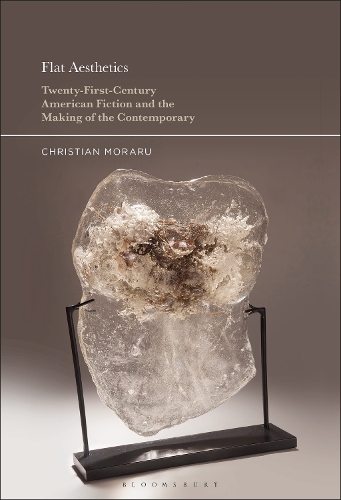
Flat Aesthetics: Twenty-First-Century American Fiction and the Making of the Contemporary
(Paperback)
Available Formats
Publishing Details
Flat Aesthetics: Twenty-First-Century American Fiction and the Making of the Contemporary
By (Author) Professor Christian Moraru
Bloomsbury Publishing USA
Bloomsbury Publishing USA
25th July 2024
United States
Classifications
Tertiary Education
Non Fiction
Literary studies: c 1900 to c 2000
Literary studies: from c 2000
Literary studies: fiction, novelists and prose writers
813.609
Physical Properties
Paperback
288
Width 152mm, Height 229mm
Description
Flat Aesthetics seeks to secure a more granular and ontologically demotic handle on the contemporary in American literature. While contemporaneity can be viewed as our period, Christian Moraru approaches the contemporary as some-thing made by things themselves. The making of the contemporary is variously restaged by the body of fictional prose under scrutiny here. Thus, this corpus itself participates in the making of contemporaneity. In dialogue with object-oriented ontology and various new materialisms, Moraru contends that the contemporary does not preexist objects or the novels featuring them; it is not their background but an outcome of things self-presentation. As objects, beings, or existents present themselves in the present, in our now, they foster thing-configurations that together compose the form of, and essentially make, the contemporary the presents cultural-material signature, as Moraru calls it. To decipher this signature, Flat Aesthetics provides a cross-sectional reading of postmillennial American fiction. Discussed are solely post-2000 works by writers who have also established themselves over the past two decades or so, from Nicole Krauss, Michael Chabon, and Ben Lerner to Colson Whitehead and Emily St. John Mandel. Their output, Moraru claims, bears witness to the onset of a flat aesthetics in American letters after September 11, 2001. Organized into five parts, the books canvases objectual constellations of contemporaneity shaped by material dynamics of language, museality and display, spatiality, zombification and thing-rhetoric, and post-anthropocentric kinship.
Reviews
Christian Moraru has been a preeminent theorist of the contemporary in literary studies. In previous studies, such as Cosmodernism, he focused on the historical movement of the contemporary in the wake of the Cold War and after 9/11 and emphasized its worldliness. In Flat Aesthetics he turns to chart its distinctive aesthetic sensibility that shifts from a center on human subjectivity to one on the mutual existence of objects, human and nonhuman, yielding a flattened aesthetics. Engaging Object-Oriented Ontology, he shows how this aesthetics runs through work by authors that have become prominent since 2000, such as Mohsin Hamid, Ben Lerner, Emily St. John Mandel, and Colson Whitehead. For Moraru, the contemporary finally is less a period than a sense of existence and an object itself. * Jeffrey Williams, Professor of English, Carnegie Mellon University, USA *
Bristling with ideas and insights, Flat Aesthetics sets in motion an exhilarating aesthetic of 'flat reading' focused on the displays, the energies, and the relations of things. Extending his previous investigations of the postmodern, Christian Moraru explores the formation of an epoch and a form that he calls the contemporary, a post-postmodern temporality in which the world of things comes into its own. * John Frow, Professor Emeritus of English, University of Sydney, Australia *
After a century or more of deep reading, the time is ripe, says Christian Moraru, for a turn to flat reading reading that 'screens literary prose for objects,' that explores these objects in themselves and in their ensembles, and that seeks to level the playing-field on which objects interact with humans and other beings. Moraru theorizes flat aesthetics, but even more valuably he models its practice in arresting, exhilarating readings of a series of post-millennial American novels by Ben Lerner, Emily St. John Mandel, Colson Whitehead, Nicole Krauss, and others. If you are curious about what comes after postmodernism in fiction, and dissatisfied with the alternatives that have been proposed so far, then Flat Aesthetics is the place to start. * Brian McHale, Professor Emeritus of English, The Ohio State University, USA, and author of Postmodernist Fiction (1987) and The Cambridge Introduction to Postmodernism (2015) *
This effervescent book, at once a broad-based mapping of contemporary American literature and a finely calibrated weave of concepts and objects, gives us a now opaque in its very flatness, elusive because so encompassingly near. * Wai Chee Dimock, author of Weak Planet: Literature and Assisted Survival (2020) *
Author Bio
Christian Moraru is Class of 1949 Distinguished Professor in the Humanities and Professor of English at University of North Carolina, Greensboro, USA. He is the author of eight books, including Reading for the Planet: Toward a Geomethodology (2015) and Cosmodernism: American Narrative, Late Globalization, and the New Cultural Imaginary (2011). He is the editor or co-editor of five books, including Romanian Literature as World Literature (Bloomsbury, 2018) and The Planetary Turn: Relationality and Geoaesthetics in the Twenty-First Century (2015).
